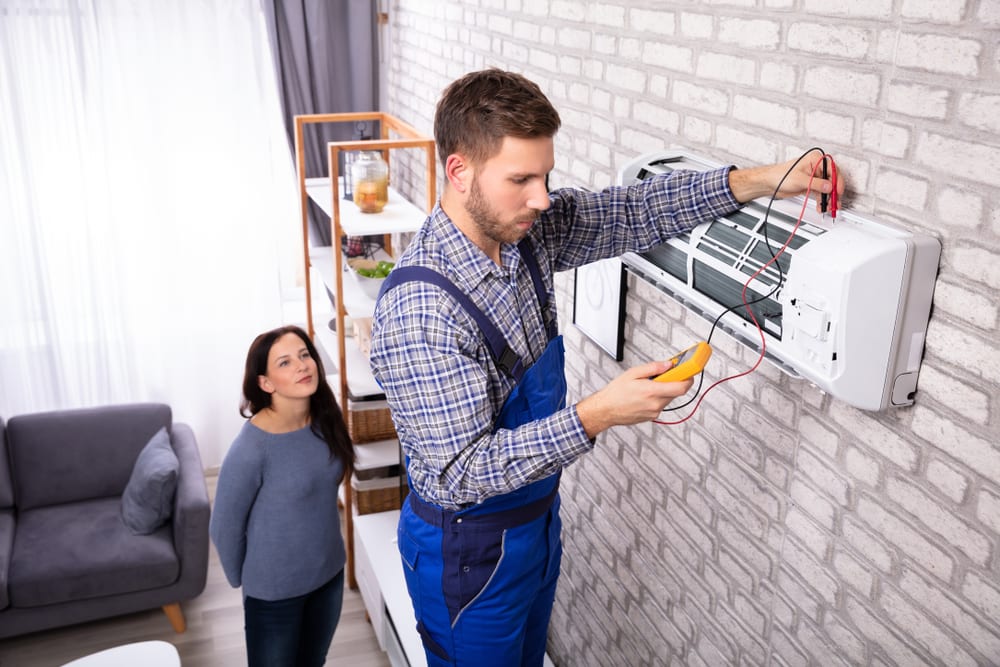When it comes to keeping your cooling system running at its best, one of the most frequent questions homeowners ask is how to decide when it’s time to replace their AC unit.
While it sounds like a relatively straightforward question, in reality, the answer depends on a number of factors.
In this article, we’ll take a look at some of the ways you can help get the most out of your existing AC unit. Next, we’ll discuss some of the factors that will help you to decide whether it’s in your best interest to install a new air conditioner.
Of course, when you do decide that it’s time to repair or replace your air conditioner, the team at Castle Home Comfort Heating & Cooling can help.
Maintaining Your AC Unit
Whether you have an older AC or you recently installed a new unit, the most important step in making sure that you get the most out of your equipment is to get a regular tune-up from a trained HVAC technician.
An annual AC tune-up is a great way to extend the life of your unit. Your technician will perform a thorough inspection on your equipment, looking for loose electrical connections and parts that are wearing out, as well as problems that may require more intensive repairs.
Once this inspection is done, the HVAC professional will clean out your unit, including the condenser coils. They will then discuss any further or more extensive repairs that might need to be done.
Regular AC maintenance provides a number of benefits, including:
- Improved indoor air quality
- Better cooling performance
- Increased lifespan of your equipment
- Lower utility bills
- Improved AC efficiency
Most of all, regular maintenance can help you determine the overall state of your AC unit. After your tune-up, you’ll know either that your system is in good shape or that you need more repairs or potentially an AC replacement.
Getting the Most Out of Your AC
One common reason that homeowners request an AC replacement is that they don’t feel like their current unit is providing their home with enough cool air. While there’s a good chance that you may need a larger or more efficient unit, it’s worth looking at other factors that could be harming the performance of your cooling system.
Even if you end up needing a replacement, fixing these issues will make your new unit more effective, too.
Look for Duct Leaks
Over time, it’s possible for your ducts to develop leaks. It doesn’t take much for your home to lose a significant amount of cool air to these cracks or holes.
Rather than trying to find and fix these leaks yourself, rely on a professional HVAC technician to do the repairs. They have the technology to find leaks throughout your ductwork and to use methods to quickly and permanently seal them.
Clean Your Ducts
The ducts in your home are magnets for dust. Over time, a thick layer of dirt, dust, and debris can form all along the sides of your ductwork. This can lead to less efficient cooling, as well as a decline in your indoor air quality. A professional duct cleaning can help to eliminate this dust from your entire system.
Check Your Home’s Insulation
No matter how efficient your cooling system may be, it won’t be able to meet your demands if your home isn’t properly insulated. In most cases, it’s usually the attic that isn’t fully insulated. Attics can reach temperatures as high as 150 degrees, and when that heat radiates through your ceiling, it can significantly impact your ability to cool your home.
Consider a Programmable Thermostat
One way to help extend the life of your cooling equipment is to install a programmable thermostat. This will help keep you from overcooling your home when you don’t need it, like overnight or when no one is home. Beyond saving you money, you’ll save wear and tear on your equipment, as well.
When to Replace Your AC
No matter how well-maintained your equipment may be, you will eventually need to replace your AC unit. For the most part, air conditioners are expected to last somewhere between 10 and 15 years, assuming that you have your equipment serviced annually.
But beyond age, there are other factors that you need to consider when trying to decide on whether it’s time to bite the bullet and replace your older unit with a new air conditioner.
Age of Your Unit
The general rule of thumb is that the longer you have your air conditioner, the more likely it is to require repairs. While this is especially true once your equipment exceeds 15 years of age, you may start noticing issues even as you approach the 10-year mark.
That’s not to say that the age of your AC unit should be the only factor to consider—in fact, if your system seems to be working without an issue, you’re probably fine.
However, as technology continues to advance, you may find that a new AC unit could dramatically improve the efficiency of your cooling system, which means that you might be able to save money over time with a replacement.
Type of Refrigerant
For many years, air conditioners were equipped to use a refrigerant called R-22. However, the EPA phased the use of R-22 out in 2020, making it harder and more expensive to find R-22 to fill older air conditioners. Eventually, all homeowners will need to transition to a system that can use the new coolant, R410A.
Switching to a newer system will save you a bundle on refrigerant alone since R-22 has increased in price more than 10 times — and it’s only going to go up over time. Even beyond cost, though, it’s environmentally responsible to shift away from this older coolant.
Your AC Efficiency
One of the most common claims made by AC manufacturers is that a new unit will save you lots of money on your monthly utility bills. The truth is…they’re absolutely right.
Your air conditioner inevitably becomes less and less efficient as it ages, and while maintenance can help slow that loss of efficiency, it can’t reverse it altogether. Combine that with improved technology, and you could be looking at significant savings month after month with a new model.
Frequency and Cost of Repairs
With regular maintenance, you can usually keep small problems from becoming big ones. However, even well-maintained systems can break down as they age, and those repairs cost you money while keeping you from adequately cooling your home.
If your unit is starting to malfunction more and more frequently, it may be time to stop spending money on repairs and spend it instead on an upgraded AC unit.
While minor problems are repaired quickly, some issues require extensive and expensive repairs. If your AC’s compressor fails or you experience a major coolant leak, you’re almost always going to be better off replacing your unit.
Performance
Another factor is whether your AC unit is still the right choice for your home. If you’ve recently built on an addition or if you have more people living in your home, your unit may no longer be able to meet your demand. Installing a more powerful AC unit will give you all the cool air you need without overextending your AC unit.
The AC Pros That You Can Trust
If you have questions about repairing or replacing your air conditioning system, contact the experts at Castle Home Comfort Heating & Cooling!

